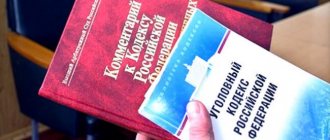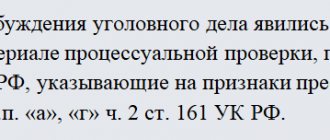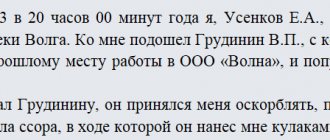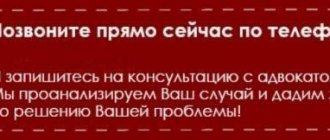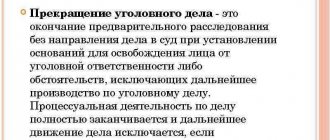Disclosure of an offense, especially a criminal offense, is carried out in accordance with the established procedure by law. This process begins with the initiation of a case and ends with a verdict passed by the court. Of course, interested parties want to know about the initiation of a criminal case. For example, today you can find out a lot via the Internet. In this regard, the question arises of how to do this, to whom the data will be disclosed and which structures are authorized to do this.
Is it possible to independently find out about the initiation of a criminal case?
Your own knowledge can help in resolving the issue.
So, in order to initiate a criminal case, certain deadlines are provided. They are common to all crimes, but can be changed in individual circumstances. In general, the initiation of a criminal case means that there is a need to conduct criminal proceedings. The decision is made as a result of analysis of available data and is supported by the publication of an appropriate document in which this fact is recorded.
There are cases when a person is detained, and while he is in the police, he cannot understand whether a criminal case has been initiated or not. His relatives also show justified concern about this issue. To clarify the situation, you need to look at the Criminal Procedure Code, namely Article 144, which contains information about the deadlines. According to it, the urgency of the procedure for investigators and interrogators can be determined in the following format:
- from the moment the application is submitted, it must be checked for three days, as a result of which a decision must be made: to open a criminal case or to refuse it;
- if there are sufficient grounds, the inquirer or investigator has the right to apply to his superiors with a request that the inspection be extended to ten days (the reasons for this may be, for example, the need to conduct an examination);
- if it is necessary to check the organization’s documentation or conduct an audit, the responsible persons send a corresponding petition to the prosecutor’s office, where they have the right to decide to extend the period to thirty days.
Your rights during a pre-investigation check
If a pre-investigation check is carried out against you or your organization, you should know that you:
- The right not to testify against oneself, one’s spouse or immediate relatives and to refuse to give explanations.
- You have the right to complain about the actions or decisions of the persons conducting the inspection (or their unlawful inaction).
- If documents belonging to you are confiscated, you have the right to make copies of them and keep these copies for yourself. If computers or other equipment containing information in electronic form are confiscated from you, you also have the right to copy it for yourself.
Invoke your right not to incriminate yourself and wait for a lawyer. As soon as the specialist arrives, he will immediately advise you on how best to act and what you should or should not talk about. If your rights have been violated, the lawyer will immediately file a complaint on the spot against the actions or inactions of officials and will take upon himself the protection of your rights, as well as the interests of your organization.
Call a lawyer during the pre-investigation check by phone +7 or. You can call these numbers 24 hours a day. The lawyer will promptly, in the shortest possible time, come to you at any time - wherever you need his support: in your apartment, office, production, at the scene of the incident and any other place in Moscow and the near Moscow region.
Where to go
If the information is unknown, then you need to wait for the period provided by law, and then contact the necessary authorities. So, you can find out this information in the department of the Ministry of Internal Affairs to which the application was submitted. Art. 145 of the Code of Criminal Procedure provides for the obligations of investigative bodies to timely inform interested citizens about the results.
Thus, if it turns out that a criminal trial has not been initiated within the time period specified by law, and the corresponding resolution has not been issued to refuse to initiate a criminal case, a person can safely write a complaint to the prosecutor’s office. To do this, you need to submit a statement in which you report the inaction of law enforcement officers.
The Gordian Knot of Pre-Investigation
We have previously repeatedly noted that this procedural institution carries with it a whole trainload of legislative defects and practical problems. Here are just a few of them:
1. The timing of the pre-investigation check is unlimited.
So, within the meaning of Part 1 of Art.
144 of the Code of Criminal Procedure of the Russian Federation, an official is obliged to make a decision on a message about any crime committed or being prepared within no later than 3 days from the date of receipt of the specified message. This period can be extended by the head up to 10 days, and if it is necessary to carry out documentary checks, audits, forensic examinations, studies of documents, objects, corpses, as well as conducting operational-search activities, the head of the investigative body, at the request of the investigator, and the prosecutor, at the request of the investigator, has the right to extend this period is still up to 30 days.
Unfortunately, provided for in Art. 144 of the Code of Criminal Procedure of the Russian Federation, the deadlines do not in any way interfere with the facts that often occur in practice of repeated cancellations of decisions made to refuse to initiate criminal cases for the purpose of artificially extending these deadlines.
As a result of such actions, the period for conducting inspections can last several months.
At the same time, the persons in respect of whom these checks are being carried out are in a state of legal uncertainty: the state has not made any claims against them, they are not yet suspects and are not endowed with the procedural rights necessary for protection, most often do not have a lawyer, but in relation to them it is already being carried out the whole range of repressive procedural measures.
The Constitutional Court, in its numerous decisions related to the consideration of complaints under Articles 144, 145 of the Code of Criminal Procedure of the Russian Federation, noted that the criminal procedure law does not imply arbitrary and repeated cancellation on the same basis of a decision to refuse to initiate a criminal case with the direction of materials for additional verification, provides for compliance with the deadlines established by law for performing procedural actions (Determinations of the Constitutional Court of December 20, 2005 No. 477-O, of October 17, 2006 No. 425-O, of May 16, 2007 No. 374-O-O , dated May 11, 2012 No. 667-O, dated December 24, 2013 No. 1936-O).
At the same time, violations of the deadlines for checking messages do not entail any adverse procedural consequences for investigators, including the recognition of the decision to initiate a criminal case as illegal or the exclusion of evidence, and therefore such arbitrary actions continue. 2. During the pre-investigation period, when the defense had not yet been formed, the legislator allowed the investigator to conduct a full-fledged investigation and obtain any type of evidence of the guilt of the future accused.
So, according to Part 1 of Art.
144 of the Code of Criminal Procedure of the Russian Federation, when checking a report of a crime, the investigator has the right to receive explanations, samples for comparative research, request documents and objects, seize them, order a forensic examination, take part in its production and obtain an expert opinion, inspect the scene of the incident, documents, objects, corpses , examination, demand documentary checks, audits, studies of documents, objects, corpses, involve specialists in these actions, give the body of inquiry a binding written order to carry out operational search activities.
At the same time, the documents obtained at this stage are accepted by the courts precisely as evidence of a person’s guilt.
This is indicated by the requirements of Part 1.2 of Art. 144 of the Code of Criminal Procedure of the Russian Federation: “ Information obtained during the verification of a crime report may be used as evidence, subject to the provisions of Articles 75 and 89 of this Code.”
It was a very reckless decision of the legislator to allow representatives of the prosecution to obtain evidence even before the initiation of a criminal case (Part 1.2 of Article 144 of the Code of Criminal Procedure of the Russian Federation was introduced by Federal Law of March 4, 2013 No. 23-FZ), when it seems difficult to ensure the implementation of the principle of equality and adversarial rights of the parties . 3. The Code of Criminal Procedure of the Russian Federation does not allow the defense attorney, at the stage of the pre-investigation check, to file a motion to perform certain procedural actions or to present any evidence of innocence.
For example, he will not be able to bring an eyewitness to the crime committed to the investigator and ask him to interview him. Within the meaning of Art. 119 of the Code of Criminal Procedure of the Russian Federation, a lawyer can file a petition only in a criminal case, which at the moment of interest to us has not yet been initiated.
4. The Code of Criminal Procedure of the Russian Federation, while providing for the right of an authorized official to extend the period of a pre-investigation check, first to 10 days, and then to 30 days, does not provide for his obligation to notify interested parties about the extension of the check period.
According to Part 8 of Art.
162 of the Code of Criminal Procedure of the Russian Federation, “the investigator notifies in writing the accused and his defense attorney, as well as the victim and his representative about the extension of the period of the preliminary investigation.”
This procedural rule, operating at the stage of preliminary investigation, seems logical and thorough, but how can we explain the legislator’s different approach when extending the inspection period, say, to 30 days? It is quite obvious that interested parties are obliged to know about such a decision of the investigator (inquiry officer) in order to be able to appeal it in a timely manner.
5. Failure to notify the person in respect of whom the inspection is being carried out about the decision to refuse to initiate a criminal case.
In accordance with Part 3 of Art. 145 of the Code of Criminal Procedure of the Russian Federation, only the applicant is notified of the decision to refuse to initiate a criminal case, and the right to appeal this decision is explained. But this resolution no less affects the interests of the person in respect of whom the audit was carried out!
6. Part 1.1 art. 144 of the Code of Criminal Procedure of the Russian Federation does not provide for the right of the defense to get acquainted with the materials of the pre-investigation check in the event of a decision to refuse to initiate a criminal case.
The investigator, who issued a formal decision to refuse to initiate a criminal case, intending to gain time and initiate a criminal case in the future, will not allow one to familiarize himself with the inspection materials, keeping in mind the notorious secrecy of the investigation.
To this it should be added that prosecutors and heads of investigative units exercise weak supervision and control over the actions of investigators and interrogators at this stage, and there is no judicial control at all.
Thus, the so-called pre-investigation practice has turned into a full-fledged, sometimes months-long investigation, not controlled by the court, which is carried out even before the initiation of a criminal case, but during which the investigator (inquiry officer) freely obtains evidence of guilt, and the person in respect of whom such the investigation is ongoing, has limited procedural rights and does not have an effective opportunity to defend itself.
This situation clearly violates the provisions proclaimed in Part 3 of Art. 123 of the Constitution of the Russian Federation the principle of equality and competition of the parties.
Subsequently, after the initiation of a criminal case, many procedural actions previously performed during the pre-investigation check are duplicated: the interviewed persons are re-interrogated, examinations may be re-conducted, etc.
The Commissioner for Human Rights in the Russian Federation, Tatyana Moskalkova, rightfully pointing out some of the problems noted, proposed abolishing pre-investigation checks altogether.
This proposal should be analyzed from the point of view of its practical prospects.
If today we exclude Art. 144 and 145, then the following could happen tomorrow.
The basis for initiating a criminal case will be only information about the presence of sufficient data indicating signs of a crime, obtained from an application, confession or report of a crime.
A similar procedure is provided for in Art. 21 of the Code of Professional Ethics for Lawyers, according to which the president of the bar association of a constituent entity of the Russian Federation, if there is a proper reason and form of appeal, initiates disciplinary proceedings against the lawyer no later than ten days from the date of receipt and does not conduct any preliminary verification of the appeal. And in this case, this order seems quite acceptable. However, in relation to the criminal prosecution of citizens, it can lead to serious negative consequences.
It is obvious that the sequestration of only two articles will lead to a significant increase in the number of criminal cases initiated. After the automatic initiation of a criminal case without a preliminary check, the question of detaining the suspect and his further placement in custody will arise. From practice, we are well aware of the commitment of representatives of the prosecution and the courts to choosing a preventive measure in the form of detention, which is estimated by statistics as exceeding 91% of all filed petitions.
An established practice may take root in which the suspect (accused) will first end up in a pre-trial detention center, and only then the investigator will begin to check his involvement in the commission of a crime, the reliability and admissibility of the victim’s testimony and other evidence. Inevitably, as the number of cases filed increases, the number of people arrested will increase.
Taking into account the established investigative customs, when the investigator and his supervisor are afraid to terminate the criminal case due to possible charges of corruption and incompetence, situations may arise in which hastily initiated criminal cases simply do not want to be terminated. Traditionally, they will be pushed out of fear into the courts for consideration on the merits.
Knowing the practice of issuing acquittals (about 0.2–0.3%) and the even sadder practice of prosecutors refusing to support charges, we will be faced with massive cases of conviction of innocent persons.
As you can see, the exclusion of only two articles (144 and 145) from the Code of Criminal Procedure of the Russian Federation can lead to catastrophic consequences for the interests of justice and law and order.
The so-called butterfly effect can occur, where a small impact on a system creates large and unpredictable consequences somewhere else at another time.
It should be recognized that the existence of a pre-investigation check makes it possible to refuse to initiate many thousands of criminal cases due to the absence of elements or events of a crime. Removing an important procedural filter will make the prosecution process easier and make citizens facing criminal charges more vulnerable. In addition, the investigators themselves are unlikely to be delighted with such innovations, because they will be forced to initiate criminal cases without any verification, and then bear personal responsibility for inevitably made mistakes.
This cannot be allowed to happen.
As the ancient writers Curtius Rufus and Plutarch narrate, in 334 BC. Alexander the Great, faced with a complex knot and losing patience, did not untangle it, but simply cut it with one blow of his sword. I believe that the complex Gordian knot of the pre-investigation check should not be cut out in such a straightforward way.
We should persistently and patiently find and unravel all the ends of this complex knot.
Firstly, to unravel the most twisted end associated with the timing of inspections in accordance with Art. 144–145 of the Code of Criminal Procedure of the Russian Federation, it is possible to reduce them to 10 days, as was previously the case in the Code of Criminal Procedure of the RSFSR, limiting the relevant officials to the possibility of a one-time cancellation of the decision to refuse to initiate a criminal case.
Secondly, to release another heavy end of the knot, allowing the investigator (interrogator) to conduct a full-fledged investigation and collect evidence before initiating a criminal case. There is no need for this because evidence should only be obtained after a criminal case has been initiated.
Third, find and pull out another twisted end that limits the procedural options of the person being investigated and his lawyer.
If we nevertheless raise the question of abolishing the check before the initiation of a criminal case, then it is necessary to provide for fundamental changes in the very ideology of the Code of Criminal Procedure, where, along with the check, the current stage of preliminary investigation should go into the procedural dustbin. But this is a completely different topic.
What Internet services to use
The virtual network today offers enormous opportunities for users to find the necessary information, for example, if the last name of the person of interest is provided. But not all the information here turns out to be reliable. For example, to obtain data related to government agencies, it is best to use only official sources. For example, you can find out about a court hearing via the Internet through the State Automated System “Justice”. This information is openly provided to all users.
Important! It is not possible to check whether a case has been opened against a person or not on the official website of the Ministry of Internal Affairs. But even in the police department itself, data on initiating a criminal case may not be disclosed to every person, since they are confidential. Therefore, you should not trust sources on the Internet that promise that they have the necessary information. Most likely, the information there will turn out to be untrue, and the user will have to fork out money to gain access to it. As a result, he will be left without money and information.
When the notification arrives
As stated above, it is the responsibility of law enforcement officials to inform individuals about the adoption of a particular decision. Regardless of whether the case is initiated or it is decided to refuse it, the registered application is assigned an identification number. The applicant and other persons must be notified of the further fate of the application.
If a decision is made to initiate a criminal case (based on Article 146 of the Code of Criminal Procedure) or refuse to do so (based on Article 148 of the Code of Criminal Procedure), employees must send a corresponding notification with a copy within one day.
This procedure applies not only in Russia. Many neighboring countries in the post-Soviet space, for example, Kazakhstan and Ukraine, have adopted similar rules.
